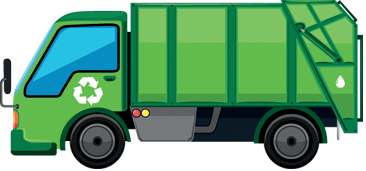Most of us reuse water plastic bottles (both PET and polycarbonate) because of their convenience and because they are cheap way to carry water. So what? What can be wrong with that, you may ask. Water was in it in the first place, right? Well, a single refill may not cause any issues but if we do that repeatedly, it can cause some serious health issues. Since they are hard to wash, the minute you unseal your new water bottle, you risk the bacteria to reproduce. The plastic used in the manufacturing of the bottles often contain a substance called BPA (bisphenol A.) or phthalates, which can be released when the plastic is wormed. This substance is endocrine disruptor and can cause hormone disorders. There is no certain evidence that the reuse of plastic bottles can actually cause fatal health issues, but until we know more, it is safer to stay away from reusing these bottles. Just throw them away along with your other rubbish removal. However, there are other options. There are bottles made of materials that do not represent any harm to our body. Check them out.
Steel bottles
 Stainless steel bottles are excellent choice for keeping your water in them. Steel is safe when in contact to drinking water so you can rest assured that they can pose health hazards. You will not have to worry whether it will stay in one piece after you accidentally drop it. It is heat-tolerant and long-lived. However, keep in mind that the inside of the stainless steel is also found in the bottle, not only on the outside. Otherwise, you have another plastic bottle that is covered with steel on the outside. However, a possible downside of these bottles is that the water might have a metallic taste.
Stainless steel bottles are excellent choice for keeping your water in them. Steel is safe when in contact to drinking water so you can rest assured that they can pose health hazards. You will not have to worry whether it will stay in one piece after you accidentally drop it. It is heat-tolerant and long-lived. However, keep in mind that the inside of the stainless steel is also found in the bottle, not only on the outside. Otherwise, you have another plastic bottle that is covered with steel on the outside. However, a possible downside of these bottles is that the water might have a metallic taste.
Glass bottles
Glass bottles have many advantages. They are cheap and easy to find. Just wash the used bottle and refill it as many times as you wish. Glass will not leak any chemical substance into your water and is also moderately heat-tolerant. Not to mention that glass is easy to recycle. On the other hand, there are also disadvantages. Glass shatter when you drop it. This is its main downside. But some manufactures have their glass bottles wrapped into coating that will not break. So, this is a plus. Another disadvantage is that these bottles can be heavy and most of us opt for lighter bottles.
Aluminium Bottles
Aluminium bottles resemble stainless steel bottles, but they have different characteristics. They are very light-weight. Aluminium bottles have to be lined with an epoxy layer or enamel, due to the fact that aluminium is reactive with acidic liquids. And, one of the main components of the epoxy layer is BPA, which indicates that it may not be safe to use. Also, these bottles are hard to clean and you cannot wash them in washing machine.
The bottom line is that using any of above mentioned bottles that you will reuse is a better option that immediately throwing away the waste along with other rubbish removal. Stainless steel bottles or plastic bottles that do not contain BPA are perhaps the best choice.

